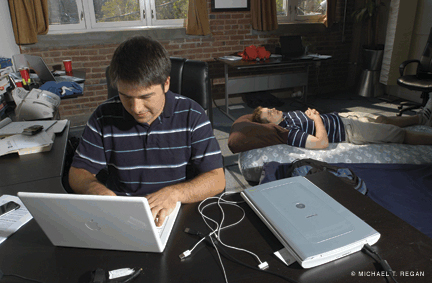
From the family-size Cheerios box atop the fridge to the cases of Snapple and Miller Lite on the floor, the Philadelphia loft Jack Abraham W’08 and Nat Turner W’08 shared this summer looked a lot like most off-campus crash pads. A heap of laundry dominated the bathroom in mid-June, and the rising seniors had rigged a yellow duct hose to a freestanding air-conditioner in their war against the heat. Robocop and Steven Seagal graced the covers of several DVD boxes that still bore price tags reading $3.99, and a neighboring stack of paperbacks included titles like How to Win Arguments and Walter Issacson’s biography of Benjamin Franklin. Upstairs, someone had filled a giant dry-erase whiteboard with 12-inch-tall letters spelling the sentence “Don’t Trust Mondays.”
But there was something about this place that gave Abraham and Turner a leg up on the typical undergrad: Wharton was basically footing their $2,000-a-month rent.
On a Monday afternoon, Abraham stood beside a video-game console wired up to a flatscreen TV. “We’ve got Guitar Hero set up,” he said, pointing toward a pair of guitar-shaped controllers from last year’s hit game. Then he punctured the illusion of slacker idleness with a telling remark, adding almost wistfully, “We keep saying we’re going to play.”
At that moment there were about 10 people in the place, and no one was watching TV. Instead, half of them were gathered around a conference table and the rest were rooted in front of computer terminals. The loft was chock full of desks and hard drives, to the exclusion of beds. A time traveler from San Francisco’s first dotcom boom would have felt perfectly at home. Air mattresses lined one side of the entrance hallway, pressed upright against the wall by a taut red bungee cord. Whenever Abraham, Turner, and their employees decided to wrap up for the day—usually around 2 a.m.—they would rejigger the office for sleep mode.
In the meantime, they were working like all get-out to launch a pair of technology companies.
Turner and Abraham were each among the winners of the inaugural Wharton Venture Award, which bestowed six $10,000 prizes upon budding entrepreneurs in April. Conceived as an alternative to the traditional summer internship, the competition was open to Wharton undergraduate juniors, first-year MBA students, and doctoral candidates. The other winners, who are spending their summers in various cities, include WG’08 class members Blake Sonnek-Schmelz, Masha Merchant, Vikram Joshi, and a partnership between Adam Erlebacher and Greg Neichen.
Clare Leinweber, senior associate director of Wharton Entrepreneurial Programs (WEP), said the award was designed to fill a critical gap in the school’s commitment to supporting student entrepreneurship. Programs like PennVention [“Gazetteer,” May|June 2007] and the Wharton Business Plan Competition [“Gazetteer,” July|Aug 2000] are tied to the academic calendar, creating a hole that stretches from May through August.
“We were well aware that there are many students that would love to be able to continue to work on ventures over the summer, and it’s just not financially possible for them to do that,” Leinweber said. “They’re forgoing an internship, and there’s also a built-in risk in putting all their time into their ventures.”
That changed when an anonymous alumnus donated enough money to fund five years’ worth of summer awards, each of which confers eligibility for a second $10,000 installment the following winter if sufficient progress has been made. Although Wharton does not take an equity position in the ventures, Leinweber hopes that entrepreneurs who parlay their awards into profitable businesses will give back to the program down the road.
Boom or bust, it’s a road Turner and Abraham were traveling at high speed in June.
Although cagey about the details, Abraham described his product as something that would enable shoppers to browse real-world shelves while securing the best prices available in the online realm. He declined to give a concrete example, but it might entail the use of a cell phone to scan a CD in a Best Buy store, say, in order to discover if Amazon.com or another retailer was offering a deeper discount. Abraham was also reluctant to divulge his business model, but seemed to be enjoying some recruiting success. The development team for his company, iBuy, included engineers based in India and Israel, in addition to the half-dozen people split between Philadelphia and Northern Virginia. In Abraham’s telling, the Wharton Venture Award was shaping up to be a springboard to real money.
“We’ve pitched to investors and we have over half a million dollars committed,” he said. Yet Abraham was considering the alternative of debt financing as a way to maximize his equity. “I really think the way to do this might be to just penetrate the market, go out there and create a ton of buzz about it at first,” he explained. “And in order to do that, we’d have to raise a significant amount of capital. I’m talking $10 million or more. So it would be top-secret until then, which might be as early as early October and as late as Thanksgiving.”
Turner, on the other hand, had already hit the marketplace with a web-based application called myTV. It was designed to take advantage of the popular social-networking site Facebook, whose parent company allows software developers to operate inside of the site’s virtual real estate. Through myTV, Facebook users can inject YouTube videos directly into their online profiles. Users get a free platform on which to assemble and share their favorite video clips; Turner’s company, Invite Media, gets to collect reams of data about their preferences, which could then be sold to advertisers.
Alternatively, Invite Media could sell actual video slots to advertisers. “In theory, Wendy’s could approach us and say, ‘We want to put this video on myTV,’ and we would make it one of the Top 15 videos of the day,” Turner explained.
“Ads are getting clever, to a point where they’re almost just videos that people enjoy watching,” he added. “So if someone sees this, 99 percent of the time they don’t think they’re watching an advertisement that we got paid for.”
Turner and his associates had already taken “several hundred thousand dollars” from an angel investor, and were pursuing licensing partnerships. “What the Venture Award allowed us to do,” he said, “was really take care of business in the two or three months where we hadn’t raised the money yet. We were able to get our office, get a couple of interns, retain a law firm to do legal stuff for us—without having to dip into credit cards and whatnot … A lot of startups kind of trip up at that point.”
The next potential stumbling block is a bit more mundane, but no less daunting: fall semester. At press time, both rising seniors were wrestling with how to handle their final undergraduate year.
“It could kill us, really,” said Abraham. “What we’re doing has a timeline. With tech, you need to meet the market need before someone else does.”
Turner, whose company already has competitors within the Facebook space, echoed the sentiment. “Our next big milestone is right near finals—December 1st,” he said.
Clare Leinweber acknowledged that the students might be tempted to take a leave of absence from school, but she expressed hope that they would return. “I really hope they’ll work it out where they can manage to keep their businesses going in a way that they’re happy with, as well as complete their education next year,” she said.
No one was under any illusion that the decision would be an easy one, though. Least of all Jack Abraham, who figured that he’ll be living and sleeping in an office for the next two years whatever the case.
“There’s a lot of money out there right now, and everybody’s looking at tech companies,” he said. “One of the things Nat and I have going for us is that we’re young … Because people are starting to realize that all of the major tech companies have been started by people basically under 26.
“And it’s getting younger,” he added.
—T.P.




